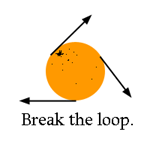

 | Tangentium |
March '04: Menu
All material on this site remains © the original authors: please see our submission guidelines for more information. If no author is shown material is © Drew Whitworth. For any reproduction beyond fair dealing, permission must be sought: e-mail drew@comp.leeds.ac.uk. ISSN number: 1746-4757 |
Feature essay: Controlled Change: The Politics of ICT and the NoösphereDrew WhitworthPage 1 ¦ Page 2 ¦ Page 3 ¦ Page 4 ¦ Printer-friendly version ConclusionLet us return to the subject matter of this essay -- what is the nature of cyberspace? I would like to suggest the following answer to that question: that cyberspace refers to the noösphere at the points of its interaction with a specific technology -- computing technology. Two important things follow from this definition. First, that this does not comprise the totality of the noösphere. It is as if we look upon a room through a small window; it would be incorrect to assume that what we can see comprises the totality of the room. Secondly, to continue the analogy, the glass in the window affects what we can see, as if it were stained glass, or some polarising filter. Similarly, the fact that our "view" of the noösphere has been directed through computing technology cannot help but influence the way in which we interact with cyberspace. This applies to us both as everyday users, and academic analysts. Because cyberspace is best viewed as a particular kind of technological interaction with the noösphere rather than a distinct realm in its own right, analysing it in isolation cannot help but be limiting. This is the problem with the sort of psychological or cultural analyses epitomised by Turkle. Considered as psychology, her analysis is useful. But her generalisations upwards ring hollow because there are simply no grounds in her argument for making them. Jordan's analysis is better, but he wastes some opportunities to root the new opportunities offered by technological developments into existing theories of political power and communication. Technological artifacts are not neutral. Meanings and values that have developed in the noösphere are encoded into them. Values can therefore be hidden in technological systems, and exert direct or indirect control over communication and the many sites of discourse which all contribute to the reproduction of the global noösphere. We must note again, however, the danger that this can become a closed argument, disallowing the possibility of change. Remember, then, that change is an inherent property of all the spheres of the Earth. When two systems interact, each influences the other, so new possibilities are created at the point of intersection. This is a very frequent happening, and sometimes does give rise to significant social or political change. More often than not, however, the new idea, species, business, or other system fails to overcome the negative feedback that arises because of the entrenched nature of other systems, and their dynamic relationship with the environment that sustains them. Systems manipulate their environment for the sake of their own self-perpetuation; what is important is that they may not always succeed in controlling change. When considering the possibility of genuinely new cultural norms or forms of human organisation arising within cyberspace, one cannot judge them (or their likelihood) without a realistic assessment of the dampening forces which will attempt to lessen their impact, repress it, or absorb it. Bauman [17] observes, for example, how many (offline) public spaces, through commercialisation and surveillance, have become places where genuine interaction between people is either redundant or actively discouraged. Public places such as the Ancient Greek agora or the 19th century coffeeshop [18] were exceptional historical "outbreaks" of public, interactive, democracy. But as Carey says, "the periods when societies are not conservative are very short and very special" [19] and human history is characterised more by the lack of such spaces -- at least, their relative ineffectiveness. When people believe they have seen the analogues of these fora in online spaces such as Usenet, they must not forget, in the rush of enthusiasm, that they play no part in most people's everyday use of cyberspace. Their co-existence alongside more repressive or commercial "zones" of cyberspace is nothing more than the uneasy co-existence of democracy and less inclusive forms of rule (bureaucracy, oligarchy, elitism, emporiocracy [the rule of commerce]), all seen through the filter of ICT, but which have existed for some considerable time before those technologies were developed. The scale of the topic under discussion demands selection and abstraction. This is an inbuilt problem with holistic views of the world -- philosophically, one claims to be discussing "everything", yet that immediately demands qualification and selection. Thus, we arrive at fragmented, individualised views of the world. But "vulgar postmodernism" is wrong to take this inevitable fragmentation and conclude that this means, underneath, there is no underlying reality. Instead, it is the diversity that is the reality. Full and sophisticated treatments of postmodernism, such as those offered by Bauman or Lyotard [20], recognise the salient features of the "information society" such as the need for mobility and the clash of differing interpretations of reality and "truth". But what we must remember is that new possibilities always arise at the point of interaction of previously existing systems. What develops from this interaction, if it can overcome the dampening forces of the status quo, will certainly be new: at the same time, it will be firmly rooted in what has gone before and will inherit some or all of the characteristics of its antecedents. So it is with cyberspace -- a new perspective on the noösphere, but not a new space in its own right. 17. Bauman, op. cit., pp. 97-105. return 18. Stallybrass and White, op. cit., pp. 82-97. return 19. Carey, Kevin (2004), "Language Engineering and Public Policy", Tangentium Jan. 2004. return 20. Lyotard, Jean-François (1984), The Postmodern Condition: A Report on Knowledge, Minneapolis, University of Minnesota Press. return | |